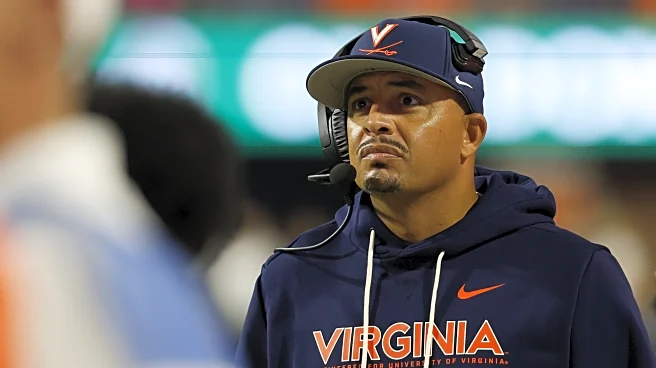There’s a lot of talk about a lack of player-to-university commitment nowadays, but universities can’t seem to commit to their coaches, either.
Billy Napier was fired as head coach at Florida football midseason.
Brent Pry of Virginia Tech suffered a similar fate. James Franklin of Penn State, DeShaun Foster of UCLA, Mike Gundy of Oklahoma State, Sam Pittman of Arkansas, and Trent Dilfer of UAB – all of them dismissed from their head coach positions during the 2025 season.
Meanwhile, Virginia Cavaliers head coach Tony Elliot is on the Bobby Dodd Coach of the Year Watch List. While UVA’s 7-1 record, bowl eligibility, and some clutch wins have revitalized the fanbase, it comes after a stale three-year start to Elliot’s tenure.
Is Virginia lucky?
Were Napier, Pry, and Franklin unlucky?
At the risk of beating a dead horse, we should acknowledge that the world of college sports is changing. While Elliot certainly has his strengths, it would be naive to think that the Virginia program just suddenly clicked for a turn-around season.
It’s more likely that the secret ingredient was a little more dough – whether it be a couple of multi-million dollar donations or revenue sharing and the transfer portal. Virginia earned big recruiting wins in the off-season, and it’s no coincidence that the program is seeing success at a pivotal time in college sports and program funding.
But, what if that doesn’t last? What if the transfer portal goes against Virginia’s favor next spring? Could that mean Elliot is suddenly out of a job?
Virginia’s athletics department has tried to increase transparency and build trust with the fan and donor base. But, onlookers may be weary of trends across college sports. While fans are critical and disillusioned with the unfamiliar rosters, a rotating door of coaches isn’t strategic.
Recently, retired Alabama head coach Nick Saban put words to the phenomenon and believes it all goes back to the money.
“The people that are giving the money think they have a voice and they’re just like a bunch of fans,” Saban said. “When they get frustrated and disappointed, they put pressure on the [athletic directors] to take action, and it’s the way of the world.”
Saban, who retired from Alabama amidst the changing landscape of college sports, is calling for some regulation – for some kind of system – to stabilize college sports.
“It’s really different. Not in a good way from a developmental standpoint. A good way from a quality-of-life standpoint [for players],” Saban said. “But we need to find a system that improves the quality of life of players but still focuses on the right stuff: development, getting an education, all those kinds of [things].”
Virginia’s own former head basketball coach Tony Bennett followed Saban into retirement, citing similar concerns for the semi-professional model.
Neither Bennett nor Saban retired out of a fear of getting fired, but because the nature of the game they loved was fading.
While NIL was meant to compensate players for being the marketing brand and image of their program, the transfer portal makes it difficult for students and alumni to recognize their school’s players. It seems sensible, then, that universities across the program strategically elevate their coaches as the only familiar face of their program.
Ironic, isn’t it? We wanted to pay players for their name, image, and likeness, and yet fans have to be reintroduced to their team every season.
And now, their coach?
I’m not here to argue against player compensation or to make value statements on any one coach’s ability or fit for the job. But, if we don’t address the mess and inconsistencies, we might forget what is at the heart of college sports.
The mass-firings (and the business scramble of revenue sharing) indicate that the NCAA and individual programs across the country have lost sight of what it means to play a game.
You have to lose. There is no magic to sports. It doesn’t just happen. It’s dramatic and romantic, but there has to be a narrative arc for the story to be fulfilling.
We can’t forget that Tony Bennett was at Virginia for ten years before winning the national championship. And the year immediately prior didn’t necessarily have a happy ending.
Several years before that, Virginia basketball was soaring through the 2014-15 regular season with a 19-0 record before losing to Duke. And the sentiment from Bennett was something along the lines of: now we aren’t afraid to lose. We have finally felt it.
And the 2019 victory over Virginia Tech football? That wouldn’t have tasted so sweet if it happened every year.
Of course, no athletic department wants to be known for their multi-generational losing streaks. I’m not romanticizing mediocrity. But I will remind the donors, coaches, and directors: fans still need something – someone – to root for.
In this cash-heavy system, I’m reminded: more money, more problems. How will the NCAA adjust to this system, without purging its teams?










